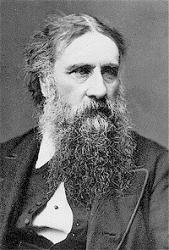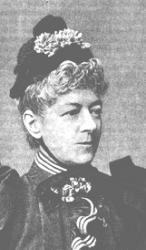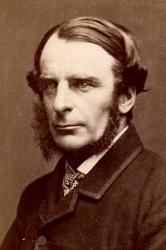1839 - 1898 Person Name: Sarah G. Stock Author of "Thy servants, Lord are dear to Thee" in The Church Missionary Hymn Book Stock, Sarah Geraldina, born Dec. 27, 1838, has devoted much time to literature with special reference to Mission work and Sunday Schools. Her prose publications include Lessons on Israel in Egypt, &c, 1874; The Child's Life of our Lord, 1879; Bible Stories from the Old Testament, &c, 1882, and others. Her hymns in common use include:—
1. A debtor! For the love of God unbounded. Missions. Written for the Church Missionary Almanack, 1878, and also issued as a C. M. S. leaflet.
2. Behind and Before. Departure of Missionaries. Written for India's Women, and sung for the first time at the dismissal of Church of England Zenana missionaries, Sep. 30, 1887. Since issued as a C. M. S. leaflet.
3. Called to Thy service, Lord. Holy Matrimony. Written for the marriage of Mr. W. Merry and Miss Grainger, of the "Home of Industry," Bethnal Green Road, London, March 14, 1889.
4. Coldly the wind is sweeping. For Workers. Published in the Church Sunday School Magazine, 1885.
5. Jesus! All-sufficiency. Teachers’ Devotional Meetings. Published in the Church Sunday School Magazine, 1882.
6. Lord of light, and Fount of love. Home Missions. Published in the Church Sunday School Magazine, 1875; in Hymns for Special Services, &c. Bemrose & Sons, &c.
7. Lord, Thy ransomed Church is waking. Home Missions. Written for the London February Mission, 1874, and published in the Church Sunday School Magazine, Feb., 1874, and subsequently in several hymn-books.
8. 0 Master! when Thou callest. Departure of Missionaries. Written for India's Women, and first sung at the Valedictory Meeting of the Church of England Zenana Society, Oct. 2, 1888.
9. Open stood the gates of heaven. Christmas. Published in the Church S. S. Musical Leaflets, No. 6, with music by C. H. Nottingham.
10. Shut out from heaven's glory. Harvest. Published in the same Leaflets, as No. 9.
11. The tender light of home behind. Departure of Missionaries. Written for India's Women, Sep. 1887, and first sung at the Valedictory Meeting of the Church of England Zenana Society, Sep. 30, 1887.
12. There's a fight to be fought, there's a work to be done. Missions. Written for the Church Missionary Gleaners' Annual Meeting, Nov. 1888, and issued as a C. M. S. leaflet.
13. We know not how the rays that stream. Holy Trinity. Written for the Church S. S. Magazine. Published in an abridged form as "We cannot read the mystery," in the Church Sunday School Hymn Book, 1868.
14. With voice of joy and singing. Thanksgiving. Written for the opening of Miss Annie Macpherson's "Home of Industry," Bethnal Green Road, London, 1887, and issued as a leaflet.
Of these hymns, Nos. 1, 7, 8, 11, and 12, were published in Eight Missionary Hymns and Poems, C. M. S., 1889. Miss Stock contributed 3 hymns to the "Golden Songs," which appeared in the Sunday School Union Sunday S. Chronicle, 1875; 7 for children to the Sunday at Home. She has also written several others on various subjects, which have been issued as leaflets. Her hymns are bright and musical, and should be sought out by hymnal compilers. Her poems are published as Joy in Sorrow, 1884. She died Aug. 29, 1898.
-- John Julian, Dictionary of Hymnology (1907)
=========================
Stock, Sarah G., p. 1094, i. The following additional hymns by Miss Stock have come into common use, mainly through the Church Missionary Hymn Book, 1899; and Hymns of Consecration and Faith, enlarged edition, 1902:—
1. A cry as of pain, Again and again, [Claims of the Heathen.] Written for the C.M.S. Gleaners' Union Anniversary, Oct. 31, 1890, and printed in the Gleaner, June 1891, p. 90.
2. He shall reign o^er all the earth. [The World for Christ.] Actual date unknown.
3. Hear ye not the tramp of reapers? [For Gleaners’ Union Meetings.] Written for the Gleaners' Union Anniversary, 1889.
4. Jesus calls. He it is Who died to save thee. [Follow Jesus.] Written for the Gleaners' Union Anniversary, 1892, and printed in the Gleaner, Dec. 1892.
5. Let the song go round the earth. [Jesus Christ is Lord.] Praise for Salvation, Written in 1898 for the Church Missionary Hymn Book, 1899.
6. Lord of love, and truth, and grace. [Intercession for the Heathen.] Date unknown.
7. 0 when shall their souls find a rest? [Mighty to save.] Written for the Gleaners' Union Anniversary,1893.
8. Once Thy servants toiled in rowing. [Divine Guardianship.] Written for the Gleaner, and printed therein Feb. 1892, p. 18.
9. Round Thy footstool, Saviour, see. [Consecration for Service.] Written for a Ladies' Meeting at the C.M.S. House, c. 1896.
10. Some one shall go at the Master's word. [The Call of the Heathen.] Written for the Gleaners' Union Anniversary, 1893.
11. The love of Christ constraining. [Farewell of Missionaries.] Written for the Valedictory Meeting of the Church of England Zenana Society in 1891.
12. They are waiting everywhere. [The Call of the Heathen.] Written for the Gleaners' Union Anniversary, 1093, and printed in the Gleaner, Dec. 1893, p. 192.
13. Thy servants, Lord, are dear to Thee. [Intercession for Missionaries.] Date unknown.
14. Treasures we have gathered here. [For a Missionary Exhibition.] Written for the opening of the Birmingham Missionary Exhibition, Oct. 1896, and printed in the Gleaner Dec. 1896, p. 195.
15. We are children of the King. [Children's Mission Hymn.] Written for the C.M.S. "Sowers' Band," 1891.
The whole of these hymns were included in the Church Missionary Hymn Book, 1899, and Nos. 1, 2, 4, 5,7, and 10, in Hymns of Consecration and Faith, 1902.
These hymns are of a special Missionary character, as their titles indicate, and in them Miss Stock has maintained her reputation as a hymn writer. Her death took place at Penmaenmaur, Aug. 27, 1898. The above details are from MS. notes supplied to us by her brother, Mr. Eugene Stock.
We must add that on p. 1094, Nos. 2 and 11 are given as two distinct hymns. This is an error. No. 2, "Behind and Before," is the Title of No. 11, "The tender light of home behind."
--John Julian, Dictionary of Hymnology, New Supplement (1907)
Sarah Geraldina Stock


